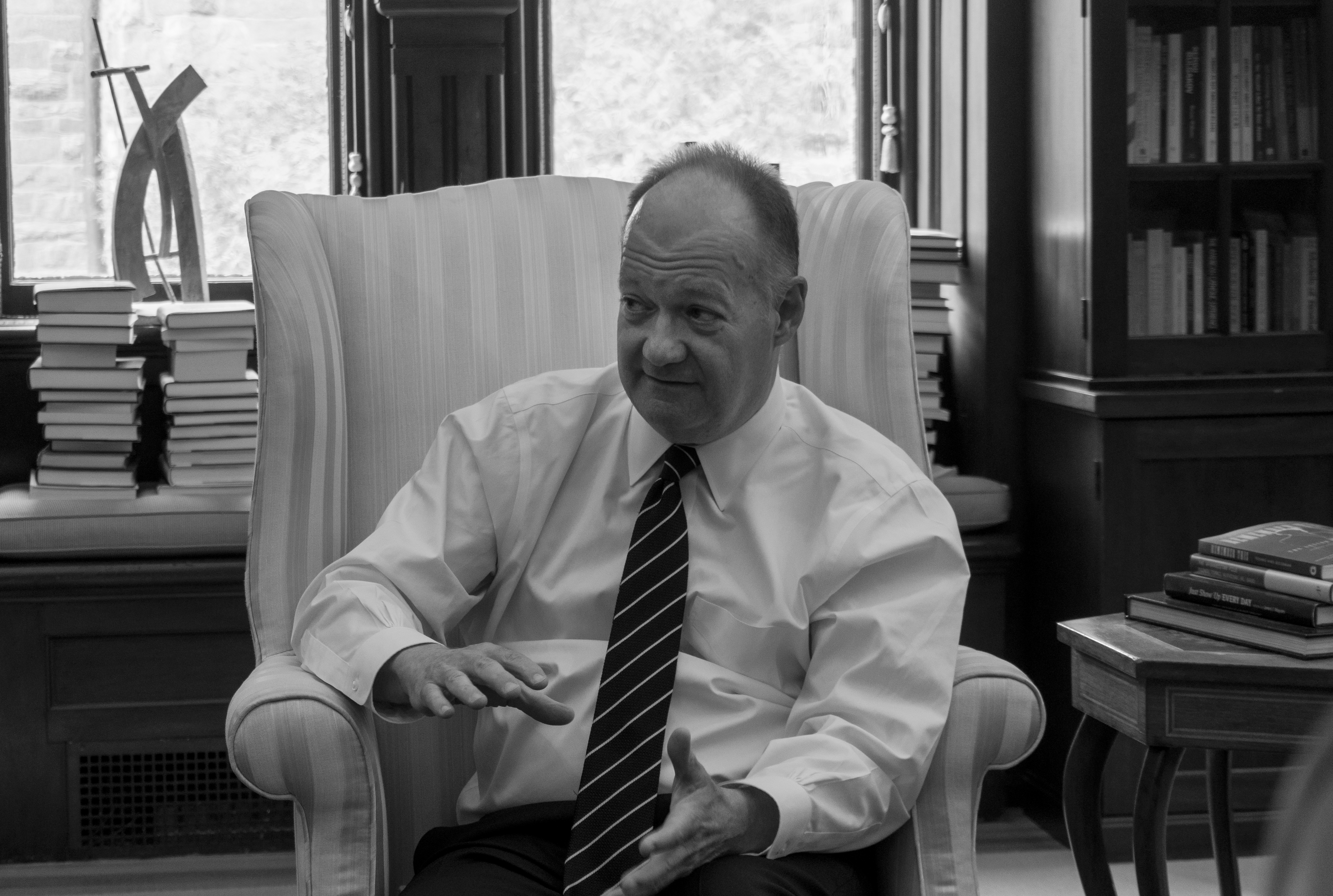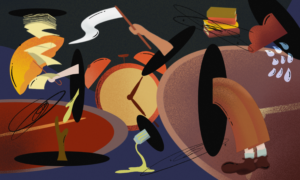Content warning: This article discusses sexual assault and violence.
The Georgetown community depends on student activists to hold the institution responsible in COVID-19 response, racial equity, mental health support, workers rights, curriculum development, and much more. Despite the pandemic, student activists have accomplished an immense amount of advocacy in the past three years. Georgetown University President John J. DeGioia sat down with a former editor-in-chief of the Voice, Sarah Watson (SFS ’22), to discuss where the Georgetown community is today on COVID-19 response, fulfillments of the Black Survivors Coalition petition, protections for DACA students, progress on the GU272, South Asian Studies on campus, and other university-wide issues.
COVID-19
After nearly two years of virtual education, Georgetown again returned to its online format in the spring of 2022—classes were virtual for the first month due to rising omicron cases. Now, masks are now optional. Two and a half years after the U.S. outbreak of COVID-19, DeGioia reflected on the university’s guiding principles throughout.
“Through this whole process, we were always guided by three fundamental principles,” he said. “Health and safety was always number one, academic continuity was number two, and protecting the livelihoods of our workforce was number three. We always wanted to ensure we were honoring those three.”
DeGioia explained that the pandemic required the university to rapidly flesh out its public health resources. “We created a new position here—Dr. Mishori is the director of Public Health, we didn’t have that before. We didn’t have navigators. We didn’t have a public health infrastructure when the pandemic started, and we do today,” DeGioia said.
The university took a multi-layered approach, including masks, social distancing requirements, vaccines, mandatory testing, random testing, and hybrid classes, to mitigate the spread of COVID-19. Random testing is no longer required this semester, but the university is testing wastewater at 29 sites. If traces of COVID-19 are detected, residents may be asked to test. For the past five weeks, the number of Georgetown cases has remained around 50 cases per week.
“Being able to get everybody back and being able to bring everybody together here on the campus has been a huge, huge goal for us. We’re very happy everybody’s back,” DeGioia said. “I think we learned more than we could have ever imagined how valuable it is for us to all be together.”
GU272 Referendum
In Oct. 2018, the student body voted on a referendum—the GU272 referendum— to establish a semesterly feed devoted to the descendants of the over 272 enslaved people sold in 1838 by Georgetown University to alleviate its debt. In 2021, Georgetown contributed $1 million in funding to support the creation of the Descendants, Truth, and Reconciliation Foundation, a national organization which develops reconciliation efforts for descendants of people enslaved by multiple Jesuit universities. The foundation was developed after conversations between representatives of the GU272 Descendants Association, other descendant groups, the university, and Jesuits.
“The work has been really inspiring,” DeGioia said. “Student leaders that have emerged from across the university, really led by undergraduates. But at the same time graduate students are engaged. Law students are engaged.”
The student group works with the Descendants Advisory Group. “The two work in tandem, with the descendants serving as kind of consultants, advisors, partners, in thinking through how best to utilize the resources,” he added.
Instead of fulfilling student plans for a semesterly fee within the 2018 referendum, Georgetown decided to raise $400,000 a year for a Reconciliation Fund to compensate Descendants. Initially, the fund was supposed to be enacted in the fall of 2020, but the pandemic delayed it for two years.
“We went live with our fundraising effort, we had 500 people contribute, there will be $400,000 to distribute as soon as they’re ready to distribute it,” DeGioia said, explaining that the Descendant community and student leaders would determine how the money is spent. According to DeGioia, the $400,000 has already been raised. “I would expect it certainly this year, because we’ve raised the money to be distributed,” he said.
On Oct. 26, DeGioia announced the launch of the Reconciliation Fund to provide $400,000 annually to support “community-based projects that aim to benefit Descendant communities whose ancestors were enslaved on Jesuit plantations in Maryland.”
A Student Awards Committee and Descendant Advisory Committee will select recipients of the award—either individuals or organizations—twice a year through an application process. The Descendant Advisory Committee will advise the funds implementation and engagement with members of the wider Descendant community.
Black Survivors Coalition
In February 2020, the Black Survivors Coalition (BSC) organized a sit-in in front of DeGioia’s office to raise attention to requests made in previous years: a 24/7 crisis response center for survivors of sexual assault, more Black clinicians at CAPS, more resources for the women’s center, extended SafeRide hours, a dedicated Women and Gender Studies (WGST) Department, and an off-campus mental health stipend. After a week of protests, the university agreed to meet many of the BSC’s demands, although there is still work to go on developing a WGST department, establishing a 24-hour center, and decreasing CAPS wait times.
COVID-19 immediately followed the sit-in and interrupted the fulfillment of BSC requests by the university. Since 2020, however, the university has worked to meet more of the initial demands.
“We’re pretty deep into responding to the framework to the requests that were made,” DeGioia said. “There were very thoughtful requests. So we engaged in it very, very seriously. Some took place immediately, some took a little bit longer, but the longer ones really involved the need to recruit some new leadership and some new colleagues.”
DeGioia pointed to new leadership like Kathryn Castle, the new assistant vice president of student health within the Division of Student Affairs, and Durriya Meer, the new CAPS director.
“With their recruitment, we then were able to add a number of new practitioners in CAPS including four colleagues, two of African American and two of Asian descent, who are now part of the team in CAPS, which complement the steps that we took,” DeGioia added.
In March 2020, the university also announced the Black Survivors Coalition Community Provider Network, with 14 mental health professionals of color available to the Georgetown community.
The BSC demands also included curriculum growth, particularly in expanding the WGST program into a well-resourced department. DeGioia also pointed to new academic leadership as crucial for the development of existing programs.
Professor Nadia Brown, who oversees the WGST program, was recruited in May 2020 to lead the program’s development. “She’s been engaged in consultations with faculty and students about how we might be able to develop the program, how we might enrich it, expand it, including some structural changes in terms of how to ensure continuing engagement of student voice in the work of advancing our program and women in gender studies,” DeGioia said.
The new dean of Georgetown College, Rosario Ceballo, also joined staff in 2021 and has a background in Women and Gender Studies.
“Building academic departments, those can take time,” DeGioia said. “But it requires from us an unrelenting commitment in focus. I think that commitment is there. And I think the leadership is there.”
South Asian Studies
In April of 2021, over 260 students and staff members signed a petition calling Georgetown to hire more South Asian professors and expand course offerings related to South Asia. DeGioia acknowledged that Georgetown’s curriculum needs to expand to include South Asian Studies.
“[Asian Studies has] been a deep part of our development over the last generation. I would recognize, I think that, we need to deepen our engagement in South Asia,” DeGioia said.
On Monday, the SFS announced a South Asian Studies Undergraduate Certificate developed by the South Asian Society, SFS Asian Studies Program, SFS Academic Council, and students and staff across Georgetown. While the university does not have an undergraduate program dedicated to South Asia yet, this certificate represents the first institutionalization of South Asian Studies at Georgetown.
DeGioia directed the future of academic programs to Georgetown’s deans. “I think fundamentally, the leadership for addressing this challenge is an academic matter,” he said. “That’s Provost Groves and Dean Ceballo and Dean Helman and we would look for them to ensure that we’re not taking our attention away from the need to strengthen and develop our academic programming in areas where we know we strive to be able to do more than where we are now.”
DACA Legislation
In August, the Biden administration released a new rule to protect the Deferred Action for Childhood Arrivals (DACA) program against legal challenges from a U.S. District Court that deemed the program “unlawful.”
DeGioia applauded the Biden administration’s executive action to protect DACA, but also called for congressional legislation to ensure the program is not easily overturned by future administrations.
“We’re very pleased because it relieves anxiety and stress on our students who are undocumented. But it’s not permanent,” DeGioia said. “As we saw with President Obama’s administrative action, it really is at the discretion of an administration. The continuing need for a permanent solution for our Dreamers remains. So we will continue our efforts in advocating on behalf of legislation that will protect our dreamers.”
Following the Biden announcement, DeGioia also released a statement reasserting Georgetown’s commitment to codifying the DACA program.
In 2019, Georgetown joined 18 other schools in an amicus brief with the Supreme Court in support of DACA. In 2021, it joined an additional amicus brief to the U.S. Court of Appeals after a Texas federal court blocked the program from future participants. In 2021, Georgetown also submitted a statement of support for its DACA students to the Department of Homeland Security.
“We’ve been at the leading edge for universities over the last two decades in supporting first, Dreamers, and then ultimately, the framework in which we discuss it as DACA,” DeGioia said. “We made a decision that we would regard our Dreamers in the same way we would any other student in access to our need-based aid program,” he added.
Bringing in the Bystander
DeGioia also commented on the ‘Bringing in the Bystander’ training. Introduced in 2017 following student activism, the mandatory 5-hour program aimed to combat on-campus sexual misconduct and interpersonal violence through safe intervention techniques. Between the 2016 and 2019 Campus Climate Surveys, the percentage of students who reported being “very” or “extremely” knowledgeable about resources increased from 24.5 to 31.7 percent.
By 2020, almost the entire undergraduate community had gone through the workshop. COVID-19, however, paused the in-person program with no training in 2021. First-years and transfer students instead completed virtual “U Got This!” bystander training in the spring of 2022, but some students commented it was less effective than in-person training.
DeGioia emphasized that the resumed program, which is now in person once again, is mandatory for all students on campus. All first-years and transfer students had to complete the course by Oct. 31 to prevent holds on their course registration for the spring semester.
“Absolutely—it’s still required,” DeGioia said. “The expectation will be that by the end of October all new students, new undergraduates will have gone through the standard training.”
“There were challenges sustaining this over the last 30 months, understood, but I think we were able to accommodate all of it,” he added, referring to the training’s delays and online platform during the pandemic.
Cardinal O’Connor Conference
DeGioia also commented on the Cardinal O’Connor Conference—an annual pro-life conference held on-campus that regularly receives student backlash. In 2021, the student group H*yas for Choice drafted a petition calling for a renaming of the conference and condemning the anti-LGBTQ rhetoric of certain panelists.
The Conference has attracted student protest for years. In 2020, at the last in-person conference, students held protests outside Healy Hall, citing the homophobic and misogynist views of panelists and O’Connor’s efforts against contraception during the AIDS crisis. Students also regularly protest the distinction between H*yas for Choice, a pro-choice student organization that is unrecognized, and the Georgetown Right to Life organization which is granted official club status.
Given the recent ruling in Dobbs v. Jackson Women’s Health Organization that has lead to near-total abortion bans in 13 states, the next conference in January of 2023 is likely to be met with more student dissatisfaction. DeGioia explained the decision to host the Cardinal O’Connor Conference, which is run by students in the Georgetown Right to Life organization, is tied to Georgetown’s commitment to free speech.
“That’s what we do here—ensure that all voices have the opportunity to to express themselves here in this community,” he said. “We don’t believe there’s anything about our commitment to the freedom of speech expression that fundamentally is in conflict with our Catholic and Jesuit identity.”
DeGioia acknowledged that many students on campus may disagree with the conference, but the university upholds a right to free speech and expression. “The way we would describe it is a line I think derived from Justice Louis Brandeis from the last century. I’ll paraphrase: ‘the best answer to difficult speech is more speech,’” DeGioia said. “We’ll protect the ability for people to express their points of view, either on the content of the view, or the person expressing the view.”
GUPD on Campus
GUPD has a history of racial bias on campus, expressed both in the BSC sit-in, campus climate surveys, and generations of Georgetown students who critique the police force for racial profiling, untimely alerts, or delayed responses to incidents.
“We learned a lot in the campus climate survey of 2020 and that has given us even more insight on where we need to focus some of our attention, particularly in ensuring that our officers are profoundly respectful of the diversity of our community,” DeGioia said.
The 2020 Campus Climate Survey asked students about their experiences of Georgetown’s culture, including sense of belonging, incidents of bias, classroom environments, and university responsiveness. The report found that Black students were more likely to be stopped on campus by GUPD than any other racial group.
Sixteen percent of Black and nine percent of Latinx undergraduate students compared to six percent of white students reported being stopped by GUPD. Nineteen percent of Black undergraduates and nine percent of Latinx students also reported feeling often or always unsafe at Georgetown.
DeGioia directed questions about GUPD to Erik Smulson, vice president for public affairs, and Jay Gruber, GUPD’s chief of public safety.
“Chief Gruber, I know, cares deeply about the capacity of the department to respond to the kinds of concerns that people have expressed,” DeGioia said. “He has put in a number of steps, especially mandatory training, and also designated one of the officers to be a community liaison.” DeGioia responded to a question about racial profiling by GUPD officers.
In Nov. 2020, the GUSA Senate established a student advisory oversight committee to oversee GUPD. The committee’s oversight included an anonymous reporting form for students to submit concerns, semesterly reports on GUPD, and policy recommendations for the administration. The committee was designed to include eight student representation from GUSA, Georgetown United Against Police Aggression, the Sexual Assault and Student Safety Policy Coalition, the Black Leadership Forum, the Latinx Leadership Forum, and the Asian-Pacific Islander Leadership Forum.
“We have a framework, including an ongoing student advisory group that meets quite frequently with Chief Gruber,” DeGioia said.
Advice for Georgetown Education
As a double Hoya with a B.A. and Ph.D. from Georgetown, President DeGioia has insight for current Hoyas to get the most out of their Georgetown experience. His advice? Patience.
“Be patient with yourself because the resources are here to explore so many different dimensions of what might make sense for you,” he said. “You’re in the process of becoming the person that you are called to be. In the years prior to getting here, you’ll discover some of that while you’re here, you’ll discover it when you continue on.”
“It’s about finding that person that we’re kind of called to be, who’s the authentic person that I am really meant to be. And becoming that person involves understanding how our decisions and actions align with our most deeply held values,” he said.
He encouraged students to use Georgetown’s resources to form parts of their identity. “Here, we offer this range of academic practices and we want you to be exposed to methodologies of knowledge,” DeGioia said. “If you decided tomorrow that South Asian dance was important to that journey, you’d be trying out for Rangila. And if it turned out you really wanted to provide emergency health response, you might volunteer for the next GERMS class.”
“What we hope is you’ve got access to the resources that will enable you to live these questions and then carry them with you. Because you won’t settle them here, but you might clarify areas of focus.”






